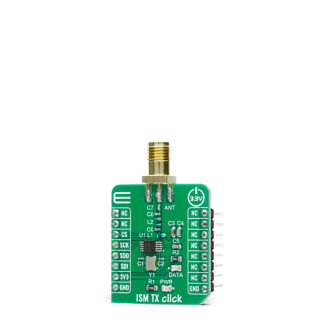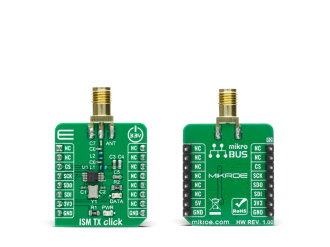
We strongly encourage users to use Package manager for sharing their code on Libstock website, because it boosts your efficiency and leaves the end user with no room for error. [more info]

Rating:
Author: MIKROE
Last Updated: 2020-09-28
Package Version: 1.0.0.0
mikroSDK Library: 1.0.0.0
Category: Sub-1 GHz Transceivers
Downloaded: 2961 times
Not followed.
License: MIT license
ISM TX Click is a compact add-on board that contains an ASK and (G)FSK transmitter with a programmable SPI interface. This board features the MAX41460, a UHF sub-GHz ISM/SRD transmitter designed to transmit On-Off Keying (OOK), Amplitude- Shift Keying (ASK), Frequency-Shift Keying (FSK), and Gaussian (G)FSK (or 2GFSK) data from Maxim Integrated.
Do you want to subscribe in order to receive notifications regarding "ISM TX click" changes.
Do you want to unsubscribe in order to stop receiving notifications regarding "ISM TX click" changes.
Do you want to report abuse regarding "ISM TX click".


Library Description
Library provides functions for communication with Click board, specific ones to configure device, setting frequency, frequency deviation, baudrate, and one for sending(transmit) data.
Key functions:
void ismtx_initial_cfg ( void ) - Function for initial configurationuint8_t ismtx_set_frequency ( uint32_t freq ) - Function for setting transmit frequencyvoid ismtx_send_data ( uint8_t *tx_data, uint8_t tx_len ) - Function for transmiting dataExamples description
The application is composed of three sections :
void application_task ( )
{
ismtx_send_data( &data_send[ 0 ], 8 );
mikrobus_logWrite( " * Transmit done! * ", _LOG_LINE );
Delay_ms( 1000 );
}
Additional Functions :
Other mikroE Libraries used in the example:
Additional notes and informations
Depending on the development board you are using, you may need USB UART click, USB UART 2 click or RS232 click to connect to your PC, for development systems with no UART to USB interface available on the board. The terminal available in all MikroElektronika compilers, or any other terminal application of your choice, can be used to read the message.